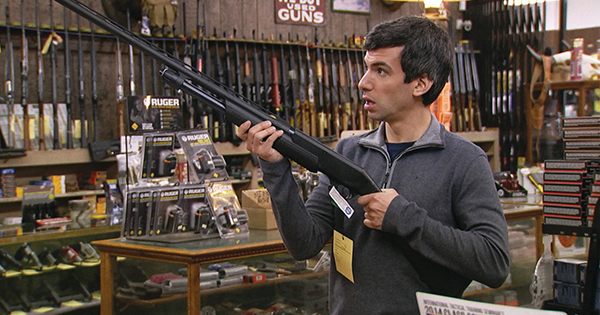
Every age has its Robin Hoods, its Tricksters, its Svengalis, its snake-oil salesmen. Shameless self-promoters are forever conning the gullible. Hapless losers are always trying to pass themselves off as heroes.
What’s rare is to find a figure who is equal parts trickster and loser. Yet that’s the only way to describe the title character of the Comedy Central series Nathan for You, which launches its fourth season later this year. The show, the brainchild of Canadian comedian Nathan Fielder, contains elements of Candid Camera and Borat as it draws unsuspecting real-life participants into increasingly outlandish fictional scenarios. There are David-and-Goliath aspects, too, in the way Nathan, a low-self-esteem business consultant, takes on the corporate establishment by turning every standard workplace practice on its head. He’s an unflappable Alice leading us down rabbit holes of his own devising. He’s a Pied Piper with a preposterous knack for getting people to follow his tune.
The whole series feels like a crackpot variation on a classic Horatio Alger story, played out in an alternative mercantile universe. Nathan’s qualification for the consultancy work he does—announced in a lusterless monotone at the opening of each show—is that he “graduated from one of Canada’s top business schools, with really good grades.” His mission: “To help struggling small business owners make it in this competitive world.” In each episode, he ventures into a Los Angeles neighborhood, seeking a retail operation—usually located in a nondescript strip mall—that, as Nathan sees it, has a branding or marketing problem. The length to which he’ll go to “help” his customers skirts the edges of legality while reaching heights of convoluted absurdity. In the process, Fielder reveals people’s gullibility and occasional greed. But he also elicits their patience and trust. It’s astonishing how tactful these folks can be with Fielder’s forlorn character, even if they’re sure he has a screw loose.
In an attempt to help a small electronics store beat Best Buy prices, Nathan’s strategy involves enforcing a rigid dress code for customers and installing a live alligator in the room where the bargain TVs are kept. (One well-dressed shopper’s reaction to the gator: “Oh, okay—that’s not good.”) In an effort to boost the business of a Los Angeles real estate agent, Nathan launches an ad campaign guaranteeing that her properties are “100 percent ghost and demon free.” This entails calling on the services of a psychic and an exorcist—and the fallout from these efforts is as intense as it is startling.
Such ploys wouldn’t work if Fielder weren’t such a genius at deadpan. His default expression recalls the Great Stone Face of Buster Keaton, and he echoes Keaton’s sad-sack poignancy, too, as he tries to establish some sort of contact with his clients that goes beyond mere business dealings. “Would you ever want to hang out sometime socially with me outside of this?” he asks an auto mechanic whose honest reputation he has enhanced by having the man hook himself up to a polygraph while giving repair estimates.
“No,” the mechanic says—and the polygraph confirms it.
In its more biting moments, Nathan for You takes zany aim at a corporate-loophole culture engaged in ethically dubious business strategies. But often, the show’s satirical salvos are aimed just as squarely at Nathan himself. In the stunning conclusion to Season Three, Nathan embarks on one of his most perverse schemes. He will make a “national hero” out of Corey, a part-time arcade attendant in his 20s who still lives at home with his folks. With the help of a makeup artist, Nathan assumes Corey’s identity and appearance. After Corey is safely sequestered in the Mojave Desert, Nathan goes to work planning a charity event that will make the news: he will walk a tightrope over an 80-foot drop between two downtown Los Angeles buildings. For seven months he trains as a tightrope walker, while establishing a romantic relationship with a genial young woman that Corey will “ultimately take over.” Nathan pulls off the stunt, and Corey, back from the Mojave, slips into the “hero” role with surprising ease, once Nathan makes his exit. Although Corey is clearly uneasy with the deception, he, like so many of Nathan’s collaborators, doesn’t want to derail a plan that seems to mean so much to Nathan.
Nathan himself, after giving this adventure his all, is left with nothing. You can see it in his skulking posture and the look of hollow pain he casts at the crowd gathered around Corey after the switcheroo has taken place. The knowledge that he will never be the hero he has created deflates him completely. And with his woebegone sense that his heroics have somehow backfired on him—that the other guy will always get both the praise and the girl—Nathan, or rather, Fielder, pulls off something close to great comedic art.
Beyond the obvious entertainment value of his antics, Fielder’s Nathan genuinely taps into the struggles we all face, whether in the workplace or in our personal affairs. He knows how grandiose our dreams can be (especially when we are overwhelmed by the competition) and how difficult it is to achieve them. With his Comedy Central resources—which include helicopters, helium balloons, housecleaning services, porn actors, expert carpenters, and plenty more—he tries to tip the balance in our favor. In the process, he also makes it plain that there’s no shortage of people in our world who are even less connected to reality than he is, and he gives them carte blanche to run with his fantasies. The results can be as cathartic as they are uncomfortable. Even a humble freelance writer can’t help but wonder what a Nathan for You intervention might do for his prospects.

